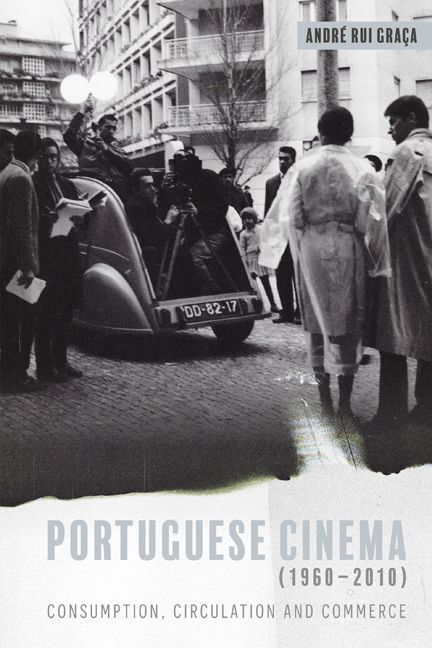Book contents
- Frontmatter
- Contents
- List of Illustrations
- Foreword
- Preface
- List of Abbreviations
- Introduction
- 1 The ‘Unsuccess’ of a National Cinema
- 2 Spectators and Contrasts in Culture
- 3 Visibility, Artistic Prestige, and Circulation
- 4 Portuguese Cinema Laws (1971–2006)
- Conclusion
- Appendix 1
- Appendix 2
- Bibliography
- Index
Foreword
Published online by Cambridge University Press: 06 April 2021
- Frontmatter
- Contents
- List of Illustrations
- Foreword
- Preface
- List of Abbreviations
- Introduction
- 1 The ‘Unsuccess’ of a National Cinema
- 2 Spectators and Contrasts in Culture
- 3 Visibility, Artistic Prestige, and Circulation
- 4 Portuguese Cinema Laws (1971–2006)
- Conclusion
- Appendix 1
- Appendix 2
- Bibliography
- Index
Summary
André Graça's new book on Portuguese cinema is a landmark study. It starts with a problem, asking the question: why has Portuguese film been so unsuccessful? Of course, one would need to clarify with greater precision the underpinning criteria for such a question; but if commercial success were the main criterion, the fact that Portugal currently holds the record of the most submissions for the Academy Award for Best International Feature Film without any Oscar nomination (35 submissions, 0 nominations) would normally decide the issue. But how about if one were to look – as the author of this book does – at how the Portuguese themselves have evaluated their own cinema? When compared to other EU countries Portugal comes in 28th – just ahead of Romania and Estonia – with just 2.5% of screen time in Portugal dedicated to national film. It just doesn't seem to add up – especially if one thinks of the brilliant films that Portuguese film-makers of the calibre of Manoel de Oliveira, Pedro Costa and Miguel Gomes have made over the years.
This is essentially the problem that this book sets out to solve, and it does so in a highly innovative as well as painstaking way. It chooses its case-study carefully, focusing on the highly significant period of Portuguese cinema, full of change as well as invention, running from 1960 until 2010. This research project then collates, triangulates and analyses the statistics relating to Portuguese cinema of this specific period, providing robust data on which films were produced, how many screenings they had, how many cinemagoers went to see them, how the distribution was managed, and what the box office revenues were. It adds into the mix a discussion of the traits that were often seen as characteristic of Portuguese cinema such as, for example, its fascination with the historical past, its predilection for films based on literary classics, and its focus on that most Portuguese of mysteries: ‘saudade’.
The author also looks at the growth of significant cinematic movements such as Portugal's ‘novo cinema’ – not to be confused with Brazil's ‘cinema novo’, though easily done – as well as its complex and sometimes fraught relationship with French, Spanish and Italian cinema (it was characterised by an ambiguous mix of fascination and resentment).
- Type
- Chapter
- Information
- Portuguese Cinema (1960–2010)Consumption, Circulation and Commerce, pp. ix - xPublisher: Boydell & BrewerPrint publication year: 2021



